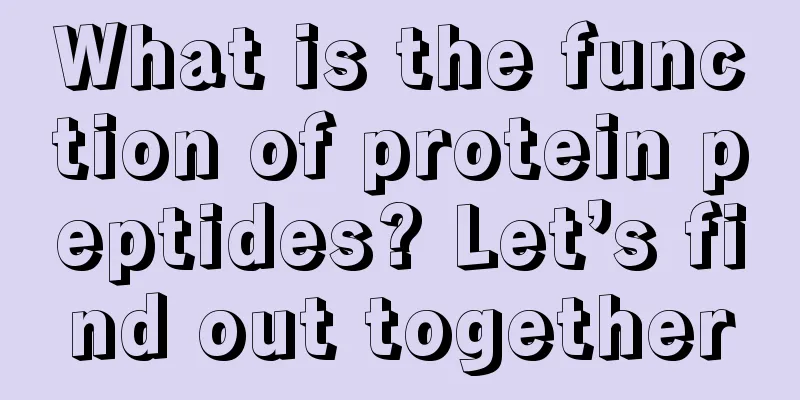What is the function of protein peptides? Let’s find out together

|
With the continuous development of society, people's work and life pressures are constantly increasing. Coupled with the induction of various bad living habits, more and more people are very lacking in protein nutrition. The main way for the human body to absorb protein is to rely on small peptides, and the absorption rate of small peptides is also relatively high. Protein peptides have multiple functions such as immune regulation, antibacterial and anti-microbial effects, and immune enhancement. Supplementing protein peptides can better replenish the various components needed in the body. Friends in need can supplement them in time. Protein peptides are indeed an indispensable part of the human body, and it is very necessary to understand its effects. 1. Introduction to protein peptides The high pressure of life, high labor intensity, long working hours and fast pace, coupled with the modern unhealthy lifestyle (smoking, drinking, playing cards, nightlife, and many sexual choices) make the human body consume twice as much energy as in the past. Therefore, even though material resources are extremely abundant, people still lack protein nutrition. The protein nutritional deficiency that experts refer to is not a lack of protein food, but a lack of small molecule protein nutrients, namely small peptides, which do not require digestion and are directly absorbed, actively absorbed, and do not burden gastrointestinal function. 2. Effects of Protein Peptides 1. Immunomodulatory function In 2013, American scientists verified the biologically active substances in shark cartilage extracts that can mediate the cytokine response of human leukocytes. When the extract and protease acted together, the ability to cause cytokine response was reduced by 80%, which shows that its active ingredient may be a protein substance. The type of active ingredient molecule was identified in the experiment, and it was proved to be a small molecule glycoprotein. According to analysis, this molecule is a type II collagen molecule derived from sharks. 2. Antibacterial effect Spanish scientists used the slice diffusion method to determine the antibacterial effect of tuna and squid collagen hydrolysates against Gram-positive bacteria, Gram-negative bacteria and fish spoilage bacteria, and found that they have antibacterial effects on certain specific bacterial groups. 3. Anti-microbial, enhance immunity Small molecule active peptides such as antimicrobial peptides, interferons, interleukins and biodefensins can activate and regulate the body's immune response, significantly increase the proliferation of human peripheral blood lymphocytes, and thus play an antimicrobial role. Other studies have shown that certain oligopeptides and polypeptides can enhance the vitality of liver cells, effectively adjust the functions of lymphocyte T cell subsets, enhance humoral immunity and cellular immunity, fundamentally improve human immunity, and are effective preparations for the treatment and prevention of various liver diseases. Protein is an important component of all cells and tissues in the human body. All important components of the body require the participation of protein. Generally speaking, protein accounts for about 18% of the total mass of the human body, and its most important thing is that it is related to life phenomena. Protein is the material basis of life, an organic macromolecule, the basic organic matter that constitutes cells, and the main bearer of life activities. There is no life without protein. In the past, scientists believed that the human body absorbs protein mainly in the form of amino acids. Recent scientific research has found that the human body absorbs protein mainly in the form of small peptides. Small peptides are more easily and quickly absorbed and utilized by the human body than amino acids. The absorption rate of small peptides in the human body is 26% higher than that of amino acids. After being absorbed by the human body, small peptides are directly used by human cells, blood and tissues. After being absorbed by the human body, amino acids must be synthesized into small peptides by the liver before they can be used by human cells and blood tissues. |
<<: How to choose meniscus knee brace?
>>: What are the symptoms of acute cerebral infarction?
Recommend
What to eat after lung cancer surgery? Follow 3 principles for diet after lung cancer surgery
Lung cancer can be said to be the most serious ma...
What should I do if the right side of my face is bigger than the left side
Many people will find that the left and right sid...
Tips to prevent mosquito bites in summer
The harassment of mosquitoes in summer seriously ...
Dietary prescription for postoperative esophageal cancer of Yin deficiency and dampness obstruction type
Some patients with esophageal cancer will have sy...
Can I do scraping on my waist?
The waist is an important part that supports our ...
Indications for dialysis
Dialysis is mainly due to the kidneys. Renal dial...
How to wash silk clothes?
In recent years, silk clothes have become more an...
Is plum pit qi an early symptom of esophageal cancer?
Plum pit qi is not an early symptom of esophageal...
Gastrointestinal growing pains
As many people know, the gastrointestinal tract i...
What does dry skin look like
Skin can be divided into many types, the most com...
What are the symptoms of pubic cancer
The symptoms of pubic cancer are mainly local pai...
Experts explain the causes of colon tumors
Colon cancer is the most common malignant tumor i...
What to do if your teeth bleed every day when you brush them
As we all know, the first thing we do when we wak...
What are the harms of soaking wolfberry in water?
Wolfberry is a traditional Chinese medicine. It c...
Abdominal distension and pain is a self-diagnostic symptom of rectal cancer
Self-diagnosis of rectal cancer found that rectal...









